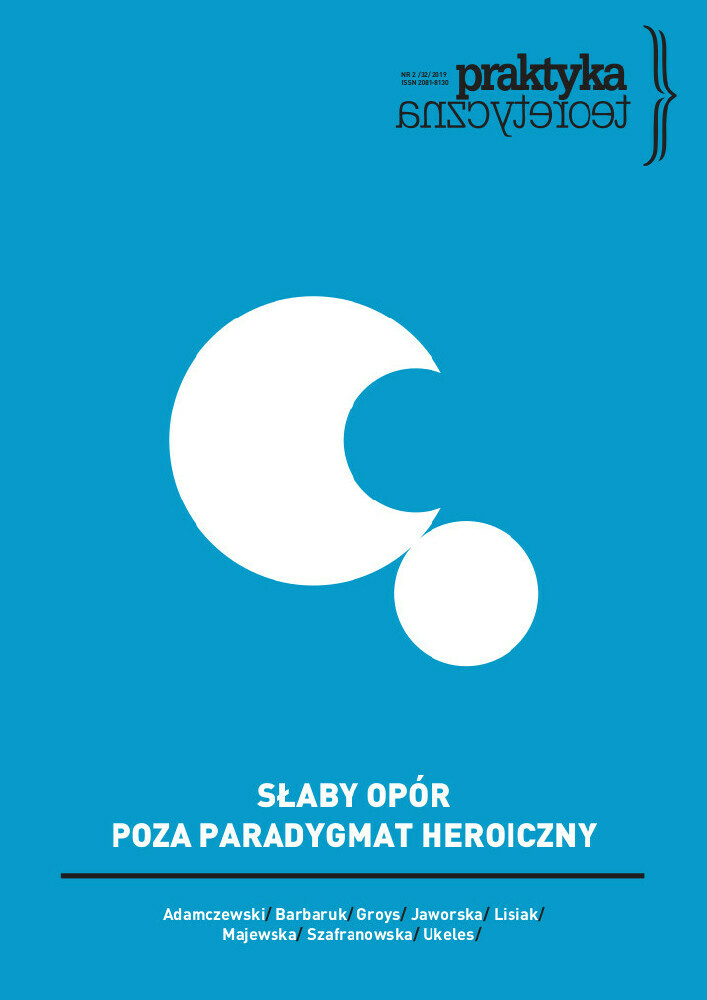Abstract
This article is the Preface for Praktyka Teoretyczna’s issue on the problem of weak resistance. It discusses the main theoretical inspirations behind the turn towards the ordinary and everyday and the resignation from heroic models of subjectivity. This text also introduces the articles published in this issue.
References
Agamben, Giorgio. 2008. Homo Sacer. Suwerenna władza i nagie życie. Tłum. Sławomir Królak. Warszawa: Prószyński i S-ka.
Ahmed, Sara. 2014. Willful Subjects. Durham and London: Duke University Press.
Butler, Judith. 2010. Walczące słowa. Tłum. Adam Ostolski. Warszawa: Wydawnictwo Krytyki Politycznej.
Butler, Judith i Gayatri Ch. Spivak. 2007. Who Sings the Nation State? Calcutta, New York and Oxford: Seagull Books.
Diderot, Denis. 1958. Paradoks o aktorze. Tłum. Jan Kott. Warszawa: Wydawnictwo Czytelnik.
Federici, Silvia. 2004. Caliban and the Witch. New York: Autonomedia.
Foucault, Michel. 1984. “Des Espaces Autres.” Architecture, Mouvement, Continuité 5: 46–49.
Habermas, Jürgen. 2008. Strukturalne przeobrażenia sfery publicznej. Tłum. Małgorzata Łukasiewicz, Wanda Lipnik. Warszawa: Wydawnictwo Naukowe PWN.
Halberstam, Jack (Judith). 2011. The Queer Art of Failure. Durham: Duke University Press.
Havel, Vaclav. 2011. Siła bezsilnych i inne eseje. Tłum. Andrzej Jagodziński. Warszawa: Agora.
Hardt, Michael i Antonio Negri. 2017. The Assembly. New York: Oxford University Press.
Hegel, Georg Wilhelm Friedrich. 1963. Fenomenologia ducha. Tłum. Adam Landman. Warszawa: PWN.
Heidegger, Martin. 1994. Bycie i czas. Tłum. Bogdan Baran. Warszawa: Wydawnictwo Naukowe PWN.
Honig, Bonnie. 2013. Antigone, Interrupted. Cambridge: Cambridge University Press.
hooks, bell. 2013. Teoria feministyczna. Od marginesu do centrum. Tłum. Ewa Majewska. Warszawa: Wydawnictwo Krytyki Politycznej.
Jaworska, Justyna. 2019. „Piękne widoki, panowie, skąd macie”. O kinie polskiego socjokonsumpcjonizmu. Kraków: Universitas.
Kluge, Aleksander i Oskar Negt. 2016. Public Sphere and Experience. Tłum. Peret Labanyi i in. London: Verso.
Korolczuk, Elżbieta. 2019. Matki i córki we współczesnej Polsce. Kraków: Universitas.
Korolczuk, Elżbieta, Beata Kowalska, Jennifer Ramme i Claudia Snochowska-Gonzales (red.). 2019. Bunt kobiet – Czarne Protesty i Strajki Kobiet. Gdańsk: ECS.
Leder, Andrzej. 2019. Był kiedyś postmodernizm… Sześć esejów o schyłku XX stulecia. Warszawa: Wydawnictwo IFiS PAN.
Majewska, Ewa. 2018. Kontrpubliczności ludowe i feministyczne. Wczesna „Solidarność” i Czarne Protesty. Warszawa: Instytut Wydawniczy Książka i Prasa.
Majewska, Ewa, Elżbieta Korolczuk, Julia Kubisa i Katarzyna Rakowska. 2019. „From the Women’s Strike to the Feminist International: In Struggle We Unite – Voices from Poland.” Viewpoint Magazine. https://www.viewpointmag.com/2019/06/18/from-thewomens-strike-to-the-feminist-international-in-struggle-we-unite-voices-from-poland/ (dostęp 29.06.2019).
Marzec, Wiktor. 2015. Rebelia i reakcja. Rewolucja 1905 roku i plebejskie doświadczenie polityczne. Kraków: Universitas.
Michna, Natalia Anna. 2018. Kobiety i kultura. O doświadczeniu w filozofii feministycznej. Kraków: Wydawnictwo Uniwersytetu Jagiellońskiego.
Ochocki, Aleksander. 2003. Trzy opery i podmiotowość komiczna. Warszawa: Fundacja Aletheia.
Peters, Sybille. 2016. „Wprowadzenie.” W Prawda jest konkretna. Red. Florian Malzacher. Warszawa: Fundacja Bęc Zmiana.
Scott, James. 1985. Weapons of the Weak. New Heavens and London: Yale University Press.
Spivak, Gayatri. 2011. „Czy podporządkowani inni mogą przemówić?” Tłum. Ewa Majewska. Krytyka Polityczna 25–26: 196–239.
Steyerl, Hito. 2015. The Wretched of the Screen. Berlin: e-flux and Sternberg Press.
Urbańska, Sylwia. 2015. Matka Polka na odległość. Z doświadczeń migracyjnych robotnic 1989– 2010. Toruń: Fundacja na Rzecz Nauki Polskiej.
Vattimo, Gianni, Pier Aldo Rovatti i Peter Carraveta (red.). 2012. Weak Thought. New York: SUNY Press.
Wróbel, Szymon i Jola Workowska. 2017. „Siła niemocy – wywiad.” Odra 4.
Zawadzki, Andrzej. 2003. „Noica, Vattimo: »mys l słaba« i jej konsekwencje”. Teksty Drugie 6: 167–178.
License
“Theoretical Practice” seeks to put into practice the idea of open access to knowledge and broadening the domain of the commons. It serves the development of science, thinking and critical reflection. The journal is published in open-access mode under the CC-BY-NC-SA 4.0 license (detail available here: http://creativecommons.org/licenses/by-nc-sa/4.0/). Articles published in the journal may be freely distributed, stored, printed and utilized for academic and teaching purposes without restrictions.
They should not be, however, used for any commercial purposes or be reconstructed into derivative creations. Access to the journal may not be limited or offered for a fee by any third party.
Prospective authors are obliged to fill in, sign and send back the publishing contract compliant with the CC licencing. [PL.pdf, PL.doc, EN.pdf,EN.doc].
According to this contract, authors grant the journal a non-exclusive right to publish their work under the creative commons license (CC-BY-NC-SA 4.0) without any financial obligation on both sides of the contract.
Before submission authors should make sure that derivative materials they use are not protected by copyright preventing their non-commercial publication. Authors are responsible for any respective copyright violations.
